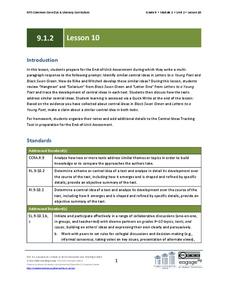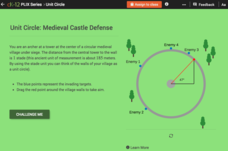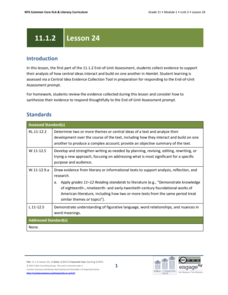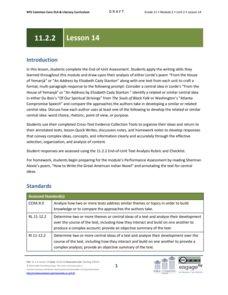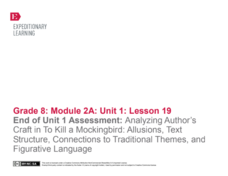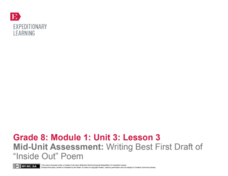EngageNY
Grade 10 ELA Module 1: Unit 3, Lesson 14
A thorough unit on literary analysis and character development culminates in a final writing assessment. Prompted to compare the parent-child relationships in Amy Tan's The Joy Luck Club and H.G. Bissinger's Friday Night Lights, high...
EngageNY
Grade 9 ELA Module 1, Unit 2, Lesson 4
As a mid-unit assessment, class members demonstrate their understanding of the concepts covered so far by crafting a formal, multi-paragraph essay in which they analyze how Rainer Maria Rilke's word choices develop the meaning and tone...
EngageNY
Grade 9 ELA Module 1, Unit 2, Lesson 10
To prepare for the end-of-unit multi-paragraph essay, class members review Rainer Maria Rilke's collection, Letters to a Young Poet, and David Mitchell's Black Swan Green and identify central ideas in both texts. Writers then formulate a...
EngageNY
Grade 10 ELA Module 1: Unit 2, Lesson 7
As a mid-unit assessment of a series of lessons that use Ethan Canin’s short story “The Palace Thief” as an anchor text, writers craft an in-class essay discussing how Hundert's character has developed throughout the text.
EngageNY
Grade 9 ELA Module 1: Unit 3, Lesson 8
As a mid-unit assessment, class members craft an in-class essay response to the prompt: "How does Shakespeare’s development of the characters of Romeo and Juliet refine a central idea in the play?"
EngageNY
Grade 9 ELA Module 1: Unit 3, Lesson 19
To prepare for the unit's final assessment essay, class members collaborate to find evidence that reveals Romeo and Juliet as tragic heroes.
EngageNY
Grade 9 ELA Module 1: Unit 3, Lesson 20
The final session in this 20-lesson plan unit asks individuals to use their Quick Writes, discussion notes, worksheets, and annotated text to craft and support a claim about how Shakespeare develops either Romeo or Juliet as tragic heroes.
CK-12 Foundation
Unit Circle: Medieval Castle Defense
Who needs a plan — let trigonometry protect you! Pupils determine the angle of an approaching enemy to a village wall. The scholars determine the exact value of trigonometric functions for the angle. Class members use trigonometry to...
EngageNY
Mid-Unit Assessment: Close Reading of the "Spadefoot Toad"
A mid-unit assessment challenges scholars to use their close reading skills to identify the main idea and key details. After reading a brief excerpt, learners answer a series of questions—multiple-choice, short answer—complete a graphic...
EngageNY
End of Unit Assessment: On-Demand Informational Paragraph About How the Poison Dart Frog Survives
A final assessment marks the end of a unit that takes a close look at a variety of informational texts all about frogs. A graphic organizer aides scholars in planning an accordion paragraph using their recorder forms from previous...
EngageNY
Grade 11 ELA Module 1: Unit 2, Lesson 24
How do central ideas build on each other in Shakespeare's Hamlet? Scholars begin the first part of an end-of-unit assessment. They complete a Central Idea Evidence Collection Tool worksheet to prepare for a writing activity to discuss...
EngageNY
Grade 11 ELA Module 1: Unit 3, Lesson 5
There's a fine line between madness and genius. Using the resource, scholars complete a mid-unit assessment based on their study of Virginia Woolf's A Room of One's Own. They write a multi-paragraph response, analyzing how two central...
EngageNY
Grade 11 ELA Module 2: Unit 2, Lesson 10
Audre Lorde's poem "From the House of Yemanjá" describes the speaker carrying two women on her back—she must be strong! Pupils read the second stanza using instructional activity 10 of 14 from the Grade 11 ELA Module 2: Unit 2 series....
EngageNY
Grade 11 ELA Module 1: Unit 3, Lesson 7
How might two completely different texts address similar topics and themes? Using the penultimate instructional activity from the eight-part Grade 11 ELA Module 1: Unit 3 series, scholars review the central ideas they developed in a...
EngageNY
Grade 11 ELA Module 2: Unit 2, Lesson 3
What is the distinction between rights and equality? Scholars continue their analysis of "An Address by Elizabeth Cady Stanton" using the third instructional activity from the 14-part Grade 11 ELA Module 2: Unit 2 series. Pupils complete...
EngageNY
Grade 11 ELA Module 2: Unit 2, Lesson 5
Elizabeth Cady Stanton compares sins to monsters, using a metaphor to make a point about morality. Using the fifth of 14 lessons from the Grade 11 ELA Module 2: Unit 2 series, learners analyze paragraphs 8-10 of "An Address by Elizabeth...
EngageNY
Grade 11 ELA Module 2: Unit 2, Lesson 12
Why is it important to make connections across texts? Scholars discover the answer with instructional activity 12 of 14 from the Grade 11 ELA Module 2: Unit 2 series. Pupils analyze the development of ideas in three nonfiction texts,...
EngageNY
Grade 11 ELA Module 2: Unit 2, Lesson 14
It's time to put it all together! Using the resource, scholars complete an end-of-unit assessment. They write a multi-paragraph essay comparing Audre Lorde's "From the House of Yemanjá" or "An Address by Elizabeth Cady Stanton" to...
EngageNY
Grade 11 ELA Module 2: Unit 1, Lesson 25
While preparing for the end-of-unit assessment, scholars look at Washington's "Atlanta Compromise" speech and identify the terms he used in the argument. They also identify the relationship between the claims presented in the speech and...
EngageNY
Grade 11 ELA Module 2: Unit 1, Lesson 24
You can never be too prepared. Scholars begin preparing for the end-of-the-unit assessment of Du Bois’s "Of Our Spiritual Strivings" and Washington’s "Atlanta Compromise" speech. They use peer discussion to discuss the relationship...
EngageNY
Planning the Introductory and Concluding Paragraphs of the End of Unit Assessment Essay
Preparation is the key to success! Using the guiding resource, scholars plan their end-of-unit analytical essays' introductory and concluding paragraphs based on their reading of Inside Out & Back Again. To prepare, they complete a...
EngageNY
End of Unit 1 Assessment: Analyzing Author’s Craft in To Kill a Mockingbird: Allusions, Text Structure, Connections to Traditional Themes, and Figurative Language
Scholars demonstrate their learning with an end-of-unit assessment. They work independently to discuss the Golden Rule and its relationship in To Kill a Mockingbird.
EngageNY
Mid-Unit Assessment: Writing Best First Draft of “Inside Out” Poem
As part of a mid-unit assessment, scholars draft their inside-out poems and then work on their "Back Again" poems. Learners use a rubric and graphic organizers to guide their writing.
EngageNY
End of Unit Assessment: Writing Best First Draft of “Back Again” Poem
Team up! Scholars begin working with their research teams to review the components of an effective poem. They then move on to independent work by beginning the end-of-unit assessment. Writers complete the draft of their "Back Again"...
Other popular searches
- United States History
- United States
- United States Maps
- United Nations
- Measurement Conversions
- Poetry Unit
- Thematic Units
- Weather Unit
- 6th Grade Poetry Unit
- Constitution United States
- Biology Unit
- Unit Circle Trigonometry




